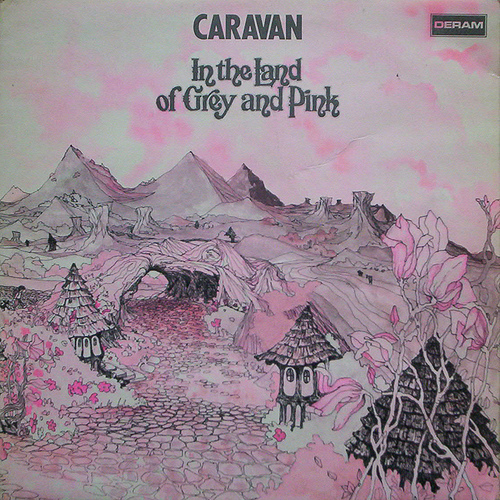Along with Soft Machine, Caravan are perhaps the definitive Canterbury Scene progressive rock act. Less jazzy than their more famous neighbours, Caravan weren’t as heavy handed as their more critically lauded peers, but what they did have was a much firmer grasp of pop dynamics and nowhere was this more obvious than their 1971 album, In the Land of Grey and Pink.
In the Land of Grey and Pink boasts three of Caravan’s most joyously accessible tunes. Both “Golf Girl” and the title track are splendid slices of psych-pop sung by bass player Richard Sinclair, although my personal favourite is the Pye Hastings’ sung (and wonderfully titled) “Love to Love You (And Tonight Pigs Will Fly)”, a bouncy flute-enhanced slab of pure-pop which deserved to be a much bigger hit than it proved to be.
“Winter Wine” is not as immediate, though it is a fine period piece, although as one of the proggier-tracks, it does struggle to make an impression compared to the more commercial material and the side-long epic “Nine Feet Underground”. It is a grower however, and it is certainly as fine a slice of Canterbury Scene prog as you’re ever likely to hear. “Nine Feet Underground”, is lengthy, almost unwieldy, but with David Sinclair’s keyboard work a highlight throughout its 22 minute duration, it is somewhat more fun than the majority of side-long prog-epics released by acts with much more heavyweight reputations.
Despite it now being considered a landmark release for Caravan, In the Land of Grey and Pink was the final album made by the original line up of the band, at least until the early 80s, as David Sinclair would leave to join Robert Wyatt’s Matching Mole. Perhaps Sinclair was disillusioned at Caravan’s lack of commercial success, however In the Land of Grey and Pink would subsequently prove to be something of a sleeper hit for Caravan, which has sold steadily since its release despite never actually charting.
A playful period piece, In the Land of Grey and Pink has endured while so many bigger-selling albums from the period have aged terribly. Perhaps a lot of this is down to the fact that it is not as over-familiar as a lot of music from the early 70s, but whatever the case, it’s an album that continues to shine out in an era not short of great albums.














No Comment